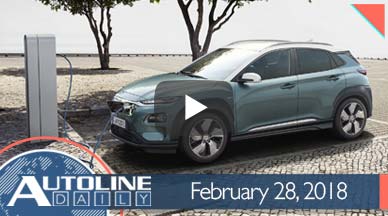
Runtime: 6:54
0:29 UAW May Lose Seat on GM’s Board
1:01 Dealers Lose Hundreds on Every New Car Sold
2:11 Volvo XC40 Highlights
3:41 Ford & Domino’s Test Self-Driving Service in Miami
4:57 Continental Creates Connectivity for Rural Areas
5:42 Hyundai Reveals Kona EV
Visit our sponsors to thank them for their support of Autoline Daily: Bridgestone , Dow Automotive Systems and Lear Corporation.
On today’s show…Ford expands its experiment with autonomous pizza delivery…U.S. car dealers lose money on every car they sell…and the UAW will probably lose its board seat at General Motors. All that and more coming right up on Autoline Daily.
This is Autoline Daily the show for enthusiasts of the automotive industry.
UAW MAY LOSE SEAT ON GM’S BOARD
The UAW VEBA trust fund is going to sell 40 million shares it owns in General Motors. And it could lose its seat on GM’s board of directors as a result. The trust fund is GM’s largest shareholder, with over 140 million shares. The trust fund was created by GM, Ford and Chrysler to cover the cost of retiree health care. Each automaker gave the UAW nearly $60 billion in stock to fund the trust, and its done a reasonably good job of managing the money.
DEALERS LOSE HUNDREDS ON EVERY NEW CAR SOLD
Here are some alarming statistics for car dealers. The National Auto Dealers Association reports that the average dealer lost $421 on every new vehicle it sold at retail last year in the American market. They lost an average of $2 on every used car they sold. Dealers made up that loss by selling financing and servicing cars, but this is an alarming trend in automotive retail. They call it margin compression, and it should be sending off alarm bells throughout the industry. If a car dealer can’t make money selling cars when the market and economy are healthy, what’s going to happen at the first sight of a downturn?
Ford is experimenting with delivering pizzas using autonomous cars and it must be going pretty well. We’ll tell you why right after this.
VOLVO XC40 HIGHLIGHTS
In a world that’s going crazy over compact crossovers, Volvo’s XC40 is an important entry to the segment. It’s built on an all-new platform, what Volvo calls its CMA, or compact modular architecture. It’s a handsome CUV that’s packed with all of Volvo’s safety technology, which all comes as standard equipment, unlike most of its competitors. In the U.S. market, it’s launching with the 248 horsepower, 2-liter, all wheel drive combination that starts just over $36,000. Later this summer there will be a 187 horsepower, 2-liter, front drive version that starts just over $34,000. The horsepower differences are due to two different turbochargers. As we’re seeing on other cars such as the Toyota Camry and Jeep Compass there are two-tone paint jobs, that in this case, offer black or white roofs. All together there are 16 exterior paint combinations and 6 interior ones. The interior layout is centered around a 9-inch display screen that’s so much in vogue today. Speaking of the interior, one of the ways that Volvo created a lot of storage space was moving the speakers out of the doors, which creates huge door pockets, large enough to accommodate a laptop. Volvo’s sales actually dropped slightly last year in the U.S. market, but with the addition of the XC40 we think that’s going to turn around.
FORD & DOMINO’S TEST SELF-DRIVING SERVICE IN MIAMI
Last August Ford and Domino’s Pizza started testing an autonomous pizza delivery vehicle in Ann Arbor and now they’re taking the operation to Miami. They’re working out all the logistics, like how the vehicle gets loaded with pizzas, and how customers interact with the service. But the real story here is that the two companies have learned enough in the first test to start expanding to other markets. Ford says it will use what it learns from this test, and others, and apply it to the design of its purpose-built self-driving vehicle that it plans to launch in 2021.
Be sure to tune in to Autolne After Hours this Thursday when we go live at 3 pm eastern time. Join John and Gary for some for the best insights into what’s going on behind the scenes in the automotive industry.
Continental developed new technology to make sure your cell phone never drops a call, but it’s actually all about making autonomous cars better. And that’s coming up next.
CONTINENTAL CREATES CONNECTIVITY FOR RURAL AREAS
Connected vehicles have the potential to drastically reduce traffic accidents and congestion as long as there is a good network for the cars to communicate. But in rural areas, network reception can be poor. No doubt you’ve experienced losing a phone call where service is weak. So to make sure vehicles stay connected in all situations, Continental developed what it calls the Predictive Connectivity Manager, which is able to “look” ahead to determine network availability and reception along the vehicle’s route. It collects data from vehicles travelling along the same route, which is then processed and analyzed by the Continental cloud. The company is demonstrating the technology at the Mobility World Congress that’s currently underway in Barcelona.
HYUNDAI REVEALS KONA EV
Hyundai just introduced the electric version of the Kona, so let’s look at the highlights. The automaker’s signature grille has been filled in with a patterned panel because, as you know, EVs don’t need the same amount of cooling power, and the cladding over the wheel arches no longer extend into the lower lighting on the front bumper. Changes to the rear fascia are minimal. There are two battery options, the larger provides 470-kilometers or over 290-miles of range and a 38-kWh pack that yields 300-kilometers or about 185-miles on a single charge. Both of those figures are based on the European test cycle, so it will likely be less when it gets rated by the U.S. EPA which has a tougher, but more realistic, test cycle. The Kona EV will first launch in Europe.
With that we wrap up today’s report, thank you for watching.
Thanks to our partner for embedding Autoline Daily on its website: WardsAuto.com

John McElroy is an influential thought leader in the automotive industry. He is a journalist, lecturer, commentator and entrepreneur. He created “Autoline Daily,” the first industry webcast of industry news and analysis.




